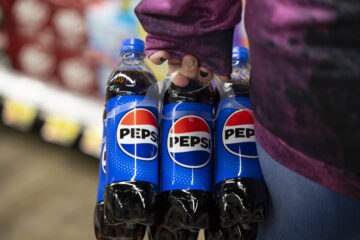Retail food brands over the last two years have faced economic headwinds, including the rising cost of doing business caused by inflation, increased interest rates and other industry-related factors.
Leroux Creek Food, an organic canned fruit and vegetable company, filed for Chapter 11 protection in August to reorganize its debts as it faced financial difficulties.
Don’t miss the move: Subscribe to TheStreet’s free daily newsletter
Aside from fruits and vegetables, the poultry industry has encountered some economic issues caused by declining prices instead of inflation.
Related: Struggling fast-food chain shutting down dozens of restaurants
Poultry prices plummeted in October 2022, which led to financial distress and bankruptcy filings that resulted in some companies going out of business.
Decatur, Ark.-based chicken producer Cooks Ventures shut down operations in late 2023 and filed for Chapter 7 bankruptcy liquidation in the District of Delaware in April 2024.
The company had secured financing on a couple of occasions totaling about $62 million to expand operations, but that wasn’t enough keep the company in business.
Struggling fresh chicken producer Pure Prairie Poultry ceased operations on Oct. 2 and unexpectedly laid off all of its plant employees after a bankruptcy judge on Sept. 27 dismissed its Chapter 11 bankruptcy case on the company’s request, according to KCHAnews.com.
“While we continue to explore options, including possible buyers for our operations, our efforts to restart the plant on a limited basis have proven unsuccessful,” George Piechel, an owner of the chicken processing plant, said in a statement. “Without a viable operating plan, we are discontinuing operations at our Charles City production plant effective immediately.”
Pure Prairie Poultry’s Chapter 11 bankruptcy was dismissed.
Pure Prairie Poultry
Pure Prairie Poultry requested bankruptcy dismissal
Pure Prairie Poultry on Sept. 25 filed a motion in the U.S. Bankruptcy Court for the District of Minnesota seeking to dismiss its Chapter 11 case after its secured creditor Community Bank and Trust objected to the poultry company’s $15 million debtor-in-possession financing proposal from Standton Capital Solutions.
Related: Iconic retail food company closing down, no bankruptcy filing yet
Without CB&T’s consent to priming liens to support the DIP loan, the debtor could not obtain the loan from Standton and lacked the liquidity to continue operating while seeking a restructuring under Chapter 11 bankruptcy.
Judge Katherine A. Constantine on Sept. 27 signed an order dismissing and closing the bankruptcy case.
More bankruptcy stories:
Big Lots retail chain ready to file Chapter 11 bankruptcyPopular retail product maker files for Chapter 11 bankruptcyMattress Firm rival files for Chapter 11 bankruptcy
The Charles City, Iowa-based company said it will seek either a sale of its assets or an out-of-court restructuring after dismissing the bankruptcy and laying off all of its employees.
Pure Prairie Poultry on Sept. 20 filed its Chapter 11 petition seeking to restructure its business and remain a going concern. The company listed $50 million to $100 million in assets and $100 million to $500 million in debts in its petition and sought up to $15 million in debtor-in-possession financing to fund operations through the conclusion of its bankruptcy case.
The debtor purchased its Charles City poultry plant in December 2021 and spent nearly a year refurbishing and retrofitting the facilities before launching whole chicken production operations in November 2022. The company had sought to upgrade the plant to serve the branded and private label premium and organic chicken retail market in six Midwestern states, including Iowa, Minnesota, Missouri, Nebraska, North Dakota and South Dakota.
The company sold its chicken products at 213 grocery stores in the Midwest before ceasing operations, according to its website.
The company had qualified for a loan of about $39 million under the Federal Food Supply Chain Guaranteed Loan Program in April 2022 to help cover the expense of its plant upgrade, and the company was confident about its future as poultry prices hit an all-time high in July 2022.
The company’s goal was to initially roll out the sale of whole chickens in November 2022 and expand processing to other chicken products once it received federal funding.
Poultry prices, however, plummeted in October 2022 and would remain depressed for about a year. While the debtor received about $7 million in federal grant funds on Oct. 20, 2022, which it planned to use as gap funding until it received the larger loan proceeds, its federal loan didn’t close until April 2023.
The delay in funding caused financial distress for the poultry producer as its plant refurbishment was not completed until November 2023, over a year and a half after it had qualified for the loan.
Related: Veteran fund manager sees world of pain coming for stocks


